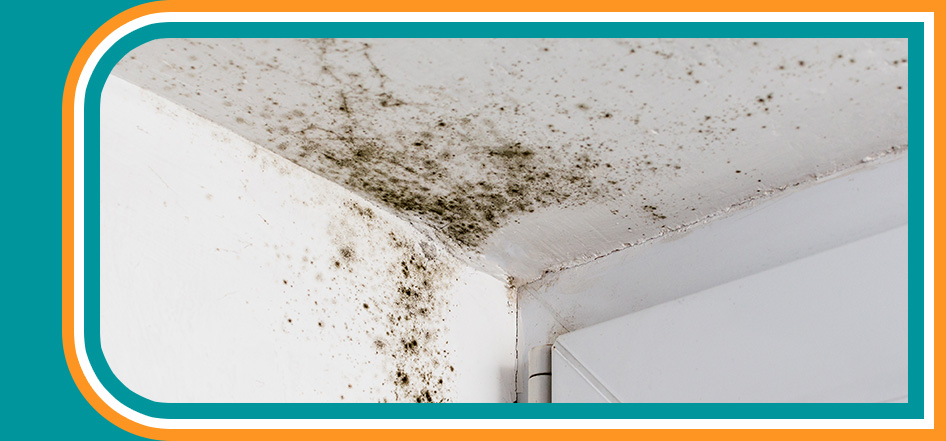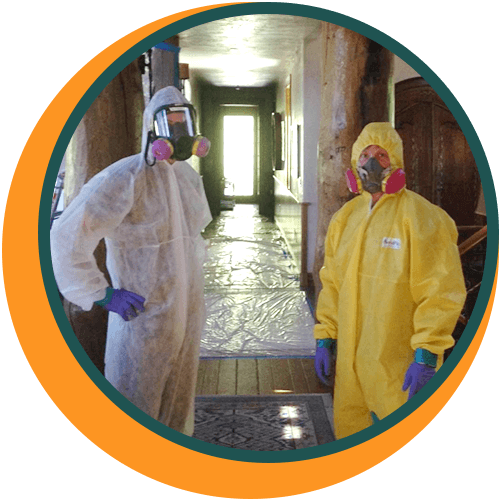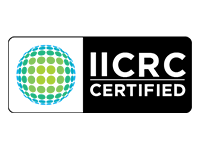
Mold Damage Remediation in Aspen
Mold Damage Restoration Services in Aspen, CO
Mold damage in your home or commercial building poses serious health risks and structural concerns that demand immediate professional attention. Ignoring mold allows it to spread quickly, which can cause respiratory issues, allergies, and even long-term health complications for occupants. Additionally, mold weakens walls, flooring, and other structural materials, potentially resulting in expensive repairs.
Finding extensive mold damage is stressful, but we are here to help. Our team at ECOS can respond quickly and get to work on evaluating the scope of the issue. We have a live operator available 24/7 who can connect you with an owner or senior manager to discuss your concerns and schedule an appointment.
Our technicians are IICRC-certified in water (WRT) and mold (AMRT) and have over 20 years of safely remediating mold damage in residential and commercial properties. We also work well with insurance companies and can work within your policy’s mold coverage limits to minimize out-of-pocket costs. Our goal is to restore safe conditions as quickly as possible.
For mold remediation services in Aspen, CO. call (970) 808-0075 or contact us online today!
How Do I Know If I Need Mold Remediation?
If you suspect a mold problem in your home or business, you should schedule a professional inspection right away. Mold grows quickly in damp environments, and waiting to address a potential issue can lead to more extensive damage, higher repair costs, and health complications. Ignoring warning signs allows mold to spread, potentially affecting structural components and contaminating the air you breathe.
Keep in mind that mold may not be immediately visible. It can lurk and grow unseen in your crawl spaces, basements, and other hidden areas where moisture may be present.
- Visible mold growth. Mold often appears as discolored patches or specks on walls, ceilings, or other surfaces. It may range in color from black and green to white or orange, depending on the type of mold and its environment. Look closely at areas prone to moisture, such as bathrooms, basements, windows, and pipes. Even a small patch of visible mold can signify a larger issue hidden behind walls or under flooring.
- Persistent musty odors. A distinct, musty smell is another strong indicator that mold may be present. This odor often occurs in places where mold is thriving but not yet visible, such as inside walls, air ducts, or under carpets.
- Water damage or leaks. Mold thrives in areas affected by water damage or persistent leaks. Stains, bubbling paint, or warped materials signal the presence of excess moisture, which creates a breeding ground for mold. Check areas around plumbing fixtures, appliances, roofs, and basements for any signs of water intrusion. Left unaddressed, even minor leaks can lead to significant mold growth over time.
- Health symptoms. Exposure to mold can trigger a variety of health problems, especially for individuals with allergies, asthma, or compromised immune systems. Watch for symptoms like frequent sneezing, coughing, itchy eyes, or skin irritation when spending time in specific areas. More severe reactions can include difficulty breathing or sinus infections. If multiple people in a household or workplace are experiencing similar symptoms, mold could be a contributing factor.
- High humidity levels. Indoor humidity levels above 60% significantly increase the risk of mold growth. You can monitor the humidity in your home or business using a hygrometer. If levels remain consistently high, especially in certain rooms, mold may already be present.
- Past flooding or water incidents. Locations previously affected by flooding are at high risk for mold development, even if the water damage appears to have been appropriately managed. Mold spores can remain dormant until conditions become favorable for growth. Similarly, if your home or business recently sustained fire damage, water from firefighting efforts could lead to mold growth if it is not properly addressed.
Because Aspen’s cold winters and heavy snow loads can drive moisture into foundations and wall assemblies, properties that are not properly sealed or insulated may develop hidden mold long before there are obvious stains or odors. Scheduling a mold remediation service Aspen property owners trust can help you identify these concealed problems early, especially in areas like basements, crawl spaces, and attached garages that tend to trap moisture in our local climate.
When you need mold remediation in Aspen, call (970) 808-0075 or contact us online to request an estimate. We offer weekend appointments and are available for emergency jobs.

What Does Mold Remediation Usually Involve in Aspen?
Mold remediation starts with a thorough inspection of the property. Our Aspen mold remediation professionals first conduct a visual inspection to evaluate visible growth and look for other telltale signs of its presence. From there, we generally recommend scheduling mold testing, a service that will be provided by a third-party air monitoring specialist. They can use advanced tools to assess the extent of the mold growth and identify the moisture source contributing to the problem. Pinpointing the moisture source is extremely important, as addressing it helps prevent further mold development. Together, we can determine the type of mold present, which helps our team tailor the remediation process to the client’s specific needs.
Once we have identified the scope and nature of the issue, we can develop and present a remediation plan to the client. This includes a transparent estimate of what the work will cost.
In most projects, the mold remediation process in Aspen will follow steps similar to the following:
- Setting up containment. After we have obtained approval from the client and their insurance company, we put containment measures in place to prevent mold spores from spreading to unaffected areas. Specialized barriers, such as plastic sheeting and negative air pressure systems, isolate the contaminated zones.
- Removing affected materials. The next phase focuses on physically removing the mold. Our team uses state-of-the-art equipment and techniques to eliminate mold-infested materials. For non-porous and semi-porous surfaces, we can apply antimicrobial solutions and scrub the mold off. We may need to remove and replace porous materials that cannot be treated effectively to eliminate all traces of harmful mold.
- Cleaning and filtering air. After we have removed the mold, we clean and filter the air in the affected areas. Using high-efficiency particulate air (HEPA) filtration devices, our team captures microscopic mold spores lingering in the air during or after the remediation process. This step is designed to improve indoor air quality and reduce the likelihood of mold resurfacing.
- Addressing underlying moisture. Repairing leaks, improving ventilation, or upgrading insulation may be necessary depending on the root cause of the mold issue. We can assist with restoration work to bring the space back to its pre-mold condition and help reduce the risk of future problems.
Reach out to our team at ECOS to schedule a visual mold inspection if you are dealing with any of the following problems:
Once we have finished our work, we also arrange for an additional, independent air clearance test to confirm that we have restored safe living or working conditions. This extra step gives you confidence that the mold issue has been addressed correctly before you return to normal use of the space.
When we provide a mold remediation service in Aspen, we also pay close attention to local building characteristics, such as older homes with stone foundations or modern mountain construction that uses tight building envelopes for energy efficiency. These features can trap moisture if ventilation is inadequate, so we may recommend long-term improvements like better bathroom exhaust, proper grading away from the foundation, or sump pump installation to help prevent future mold problems from recurring in your property.

Why Choose ECOS?
-
We specialize in 24/7 emergency services to restore order as soon as possible.
-
We provide a full range of environmental, catastrophe, and residential services.
-
ECOS has been in operation for over 20 years.
-
ECOS provides a 1 year guarantee on your water damage repair service.
-
ECOS Technicians are IICRC Certified.
-
We work directly with your insurance company for a seamless process.

How Does Aspen’s Winter Snowfall and Spring Thaw Contribute to Moisture Issues and Mold Growth?
Aspen’s heavy winter snowfall and subsequent spring thaw create significant moisture challenges that can directly lead to mold growth. During the winter, snow accumulates around homes and other structures, often piling up against foundations and walls. This build-up increases water exposure as the snow melts, releasing moisture into the surrounding soil and potentially seeping into basements or crawl spaces. Poorly insulated windows and roofs can also lead to condensation, especially when indoor heating systems clash with the cold temperatures outside.
When spring arrives, the thawing snow can release large volumes of water over a short period. The ground may already be saturated from the melting snow, leading to poor drainage and water pooling near structures. This excess moisture fosters an ideal environment for mold spores to thrive, especially in dark, damp areas like basements or improperly ventilated spaces. Mold colonies grow rapidly when warmth from the spring sun combines with these high-moisture conditions.
Property owners in Aspen can reduce mold risk during these seasonal shifts by focusing on a few key prevention steps:
- Monitor drainage patterns. Watch how meltwater flows across your yard, driveway, and walkways, and look for areas where water consistently pools near the foundation or entry points.
- Maintain roofing and gutters. Keep gutters, downspouts, and roof valleys clear of ice and debris so water is directed away from the structure instead of backing up under shingles or over eaves.
- Inspect basements and crawl spaces. Check lower levels frequently during the thaw for damp spots, seepage, or musty odors, and use dehumidifiers or sump pumps where appropriate.
- Improve ventilation. Ensure that bathrooms, kitchens, and laundry areas are vented to the outside and that crawl spaces have appropriate ventilation to help reduce trapped moisture.
Homeowners and business owners must actively monitor areas prone to water exposure, address leaks early, and maintain strong ventilation to reduce the risk of mold development, especially during these transitional seasons. If you’ve discovered significant mold due to spring thaw, our Aspen mold remediation professionals can provide the efficient and comprehensive support you need to move forward.
The sooner you address a mold problem, the better. Call (970) 808-0075 or contact us online today.



